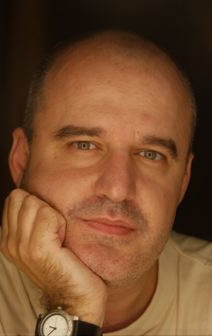
Juanjo Gimenez
A filmmaker from Spain, Juanjo Gimenez has been making film since the early 90's. In this interview, he talks to us about shooting in Spain, his financial suicide that turned into something charming, and his new projects. Gimenez's short films have been awarded numerous times at Spanish and international film festivals.
F.A. The plot of two of your short films, namely Maxima Pena and Libre Indirecto, revolve around a soccer game. Why did you choose to base these films on this particular sport?
J.G. For many reasons... I was an amateur soccer player myself until I seriously injured my left knee. This prevented me from building a career for myself as a soccer player. So, now I make films about soccer (maybe for vengeance). Another reason could be that there are only a few interesting films about soccer in the history of cinema, and I'm trying to reverse this situation.
F.A. Tilt (Nos Hacemos Falta) is your first feature film, and you mention in one of your comments that there has been a lot of changes in the script through out the journey of making this film. Can you tell us about some of the factors that caused these changes?
J.G. Tilt was a financial suicide, and we had to shoot the film without knowing if we could ever finish the production successfully. We were deciding on a lot of things on the fly, even rewriting the script everyday in the last moment. And we had a lot of restrictions, mainly because of the financial constraints. But in the end, even if we could have done things differently, every film has its own nature, and Tilt's charm comes from its own problems.
F.A. Do you mainly shoot your films in Spain? If so, how much does the Spanish government help out in funding your projects? What are some other ways you use to finance your films?
J.G. Yes, I shoot in Spain. Without the government support (central in Madrid and also the Catalonian government) I think that making films would be a really tough task. The other sources are of course TV pre-sales and sponsoring. I think that co-production (in Spain and with foreign partners) is usually essential. Short films are different: Usually there's no support in advance, and every short is a bet that in most cases ends losing money (besides some little wonderful exceptions)
F.A. As an independent filmmaker, you have been using the internet for the distribution of some of your films. What are some advantages and disadvantages (if there is any) of this type of distribution as a filmmaker? Would you recommend it to other filmmakers?
J.G. I’ve always seen the internet as an opportunity rather than a menace, even in its early days. But I think now it is more of a marketing tool than a direct source for financing or serious distribution. Maybe in the next years, the situation will change. In the meantime, I try to keep myself updated with any new movement. I follow blogs, film sites, etc., since the internet landscape changes so rapidly.
F.A. Is there a new project you're working on at the moment? If so, can you tell us about it, how you financed it, and how you're planning to promote it?
J.G. I'm in a middle of a bunch of projects. Two features as a producer with my current company (Nadir Films SL
www.nadirfilms.com) and I directed recently a short film that now is in the final steps of post-production. This short is very special, and breaks the rule of my previous answer: I was granted with a prize from Canal + Spain and Valencian Television, as a winner of the "Short Project" that they organize every year, in conjunction with the Cinema Jove Festival. The premiere will be on June 20th in Valencia (Spain), and of course you're invited. The "paella" is delicious over there.
About the filmmaker: Juanjo Gimenez was born in Barcelona, and studied at the Center for Cinematografic Studies of Catalunya (CECC). In 1994 he made his first short film ‘Hora de Cerrar’ (Closing Time) and founded the production company Salto de Eje SL.
Some shorts directed by Juanjo are: ‘Special (When Lit)’ (1994), ‘Velada’ (1995), ‘She's Angry’ (1996), ‘Indirect Free Kick’ (1997), ‘Máxima Pena’ (2005), ‘Nitbus’ (2007) and ‘Rodilla’ (2009). His shorts have obtained many awards, in Spanish and international festivals. His first feature film was ‘Nos hacemos falta – Tilt’ (2003) awarded also in Gijon, Ourense and Las Palmas. He also produced “My grandmother’s house” winner of Amsterdam’s IDFA in 2005 and nominated for the European Academy Awards, and “Estigmas” (2009) both directed by Adan Aliaga, among other features and documentaries.
For more information about the filmmaker, visit his Film Annex page at
www.filmannex.com/Rikkinadir

